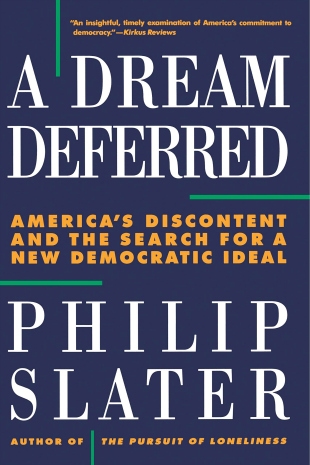"Decentralization makes democratic systems receptive to innovation. Historians and anthropologists have frequently commented on the fact that major cultural breakthroughs rarely come from societies that already enjoy positions of eminence in the world — those deeply invested in things as they are. If they did, Egypt would still be the center of the Western world. Cultural dominance has always shown a tendency to hop around the globe — the hicks and barbarians of one age are the rulers and aesthetes of the next. This has been called 'the law of local discontinuity of progress' — the tendency for the cultural advances of the future to come from the cultural boondocks of the present.
"This same is true of technological change. Our major innovations have come not from corporate behemoths but from individuals or small groups working outside traditional frameworks. Corporations are forever congratulating themselves on their large staffs of inventors, but their purpose is to invent elaborations on what they already do. Marshall McLuhan was exaggerating only slightly when he said, 'No new idea ever starts from within a big operation. It must assail the organization from outside, through some small but competing organization.' Walter Adams and James W. Brock observed that very small firms produce twenty-four times as many innovations per research and development dollar as large corporations.
"One key to democratic efficiency, then, is the rapid acceptance of new ideas. People in highly centralized positions of authority have internalized patterns that have brought them success, and are not likely to be receptive to ideas that might undermine his state of affairs. Their minds have a prior engagement. When change comes, it is people less invested in the status quo who are in the best position to take advantage of that change, and it is these 'agenda-free' individuals who are most likely to come up with the new ideas in the first place.
"In societies with primogeniture, for example, it was the younger sons who became the adventurers, explorers, entrepreneurs, and artists, while their elder brothers managed the estates and chased foxes. 'In Japanese folk wisdom,' says William Goode, 'it is the younger sons were the innovators.' For similar reasons it seems likely that the most important social innovations of the next century will come from women, who are freer from the male-dominated agendas and patterns of the present era, and hence in the best position to break the tedious cycle of competitive male narcissism that has spread such a pall of frantic stagnation, angry repetition, and belligerent decay over all areas of human endeavor today.
"In nature, species adaptation to changing conditions is made possible through mutation. Authoritarianism allows for change only through death or conquest. The political forms of democracy provide far more flexibility. Each time a new slate of candidates is elected, an opportunity is created to abandon any obsolete policies and strategies to which the previous incumbents might have been committed. Wars can be ended, policies reversed, new programs initiated, and so on. (The willingness of the people to avail themselves of this opportunity, however, depends on how much the underlying assumptions and beliefs of the democratic megaculture have taken root — institutions will not do it alone.)
"Democracy, then, is a cultural mechanism for maximizing the accessibility of agenda-free individuals — a way of more rapidly exposing such individuals to new situations as they arise."
